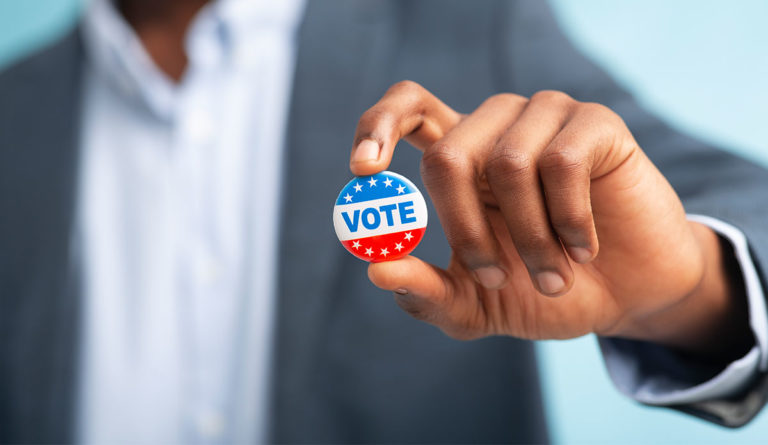Protect Public Health by Protecting the Right to Vote
Prioritizing voting rights will help improve and protect public health.

Read Time: 5 minutes
Published:
Public Health Post is pleased to announce this year’s student essay contest winner, Samantha Burkhart.
Thank you to final judge Paul Shafer, and to our 2021 PHP writing fellows Devin O’Donnell, Sara Mar, Maya Thirkill and Rubina Veerakone, who served as preliminary judges as they wrapped up their fellowship last month. We appreciate all the students who took the time to enter by writing about a public health policy that should be prioritized this year. Keep an eye out for our next student essay contest planned for Spring 2023!
Congratulations to our winner, and here’s her appeal to Speaker of the House Nancy Pelosi.
Dear Madam Speaker,
At the heart of health lies a functioning democracy. Research shows that residents living in democratic systems experience better health outcomes. Yet today the health of the American people is threatened by attempts to undermine the foundation on which democracy stands – voting.
The social determinants of health often shape the well-being of the population. Education, built environment, access to health care, economic stability, and social and community context frequently determine health outcomes over an individual’s life course. Whether at the local, state, or federal level, Americans shape the social determinants of health through casting their ballots.
The ability to improve one’s health through voting is known as social capital—a necessary component of long-term health. Social capital has repeatedly been linked to improved health outcomes. Through participation in the political process, individuals can express their support for candidates and ballot initiatives that directly and indirectly affect the health of voters and the communities they live in.
Voting at the state and local level directly impacts the social determinants of health. State and local governments make decisions about transportation, land use, education reform, and investments in public parks and libraries. Each of these policies on its own has the power to improve the health of a community. Combined, they can change population health.
Missouri and Oklahoma offer case studies of citizens using their vote to improve health through ballot initiatives to expand Medicaid. In these states, the people exercised their vote to increase access to health insurance for low-income individuals. As a result, an estimated 275,000 Missourians and 190,000 Oklahomans will soon have health insurance.
In 2013 the Supreme Court overturned Section 4 of the Voting Rights Act in its ruling in Shelby County v. Holder, ushering in a new era of election legislation that led to an increase in voter suppression tactics. Prior to Shelby, states with a history of voter suppression needed to receive prior authorization, known as preclearance, before enacting voting legislation. When the Supreme Court invalidated the coverage formula in Section 4, some states added strict voter identification requirements, closed polling places, removed early voting, decreased ballot drop boxes, and even made it a crime to give voters in line food and water.
Laws like these have effectively suppressed the ability of Americans to express their will through voting. People of color, disabled individuals, those living in rural places, and the elderly have all been disproportionally impacted by voter suppression laws, leading to further inequities in health.
Nine years after the Supreme Court ruling, Congress has the opportunity to carry on the bipartisan legacy of protecting voting rights by passing the John Lewis Voting Rights Act and the For the People Act. The John Lewis Voting Rights Act would create a new coverage formula to protect against voter suppression in elections. The bill meets the requirements that the Supreme Court set by using updated evidence regarding voter suppression tactics. If passed, the John Lewis Voting Rights Act requires states who commit 10 or more voting rights violations within a 10-year period to have proposed election law changes reviewed by the Department of Justice or a federal court before enactment.
The For the People Act builds on the John Lewis Voting Rights Act by creating new campaign finance laws and prohibiting gerrymandering. These voter suppression tactics have been shown to be used by both political parties to create a more unjust and elitist election system that disenfranchises those lacking power and wealth.
Voting rights cannot wait.
Voting rights cannot wait. As the United States heads into the 2022 midterm elections, polls show that Americans are increasingly concerned about the state of democracy. While the reasons behind this phenomenon might differ, the call to action is clear—Congress must act ahead of the 2022 elections to restore faith in democracy.
Throughout history, voting rights have been a bipartisan issue. Prior to the Shelby ruling, Congress had come together across party lines to reauthorize the Voting Rights Act every time it expired. Both Republican and Democrat presidents signed the law, with President Ronald Reagan stating that “the right to vote is the crown jewel of American liberties” after signing the 1982 extension.
Madam Speaker, I urge you and your colleagues to prioritize the John Lewis Voting Rights Act and the For the People Act. The health of democracy, and thus the health of the nation, depends on the actions you do or do not take in the coming months. As Justice Breyer stated, the purpose of elections is “not to test the fortitude and determination of the voter, but to discern the will of the majority.” It is time for the 117th Congress to come together to protect the will of the majority by protecting the right to vote.
Photo via Getty Images



